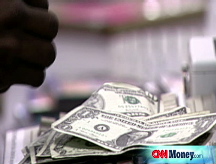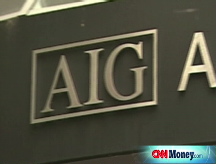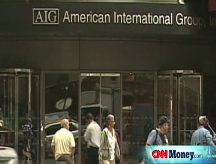Another thrashing for stocks
Dow's 449-point drop is year's 2nd worst as AIG bailout spreads fear to financial sector.

NEW YORK (CNNMoney.com) -- Stocks plummeted Wednesday, with the Dow industrials falling 449 points in its second worst session of the year, as the government's emergency rescue of AIG amplified fears about the stability of financial markets.
The Dow Jones industrial average (INDU) lost 449 points, or 4% and fell to the lowest level since November 2005. The Standard & Poor's 500 (SPX) index lost 4.7% and fell to its lowest point since April 2005. The Nasdaq composite (COMP) lost 4.9% and ended at its lowest point since August 2006.
Selling pressure eased in the mid-afternoon as the jump in oil and gold prices boosted the underlying stocks. But any recovery attempt lost steam and the market finished the session just above the worst levels of the day.
After the close, a New York Times report said that Morgan Stanley (MS, Fortune 500) was considering a merger with Wachovia (WB, Fortune 500) or another bank.
Morgan Stanley (MS, Fortune 500) shares had tumbled 24% during the session on worries about its profits and ability to raise capital, even though the company announced better-than-expected quarterly results Tuesday night. Goldman Sachs (GS, Fortune 500) also slumped despite having reported better-than-expected results. (Full story)
Also after the close, a Wall Street Journal report said that Wells Fargo (WFC, Fortune 500) and Citigroup (C, Fortune 500) have expressed interest in Washington Mutual (WM, Fortune 500), the mortgage lender that has seen its business erode in the housing market collapse.
Financial stocks tumbled. The Philadelphia KBW Bank (BKX) index fell almost 8% and the Amex Securities Broker/Dealer (XBD) index fell over 10%.
Small cap stocks were hit, too, with the Russell 2000 (RUT) index sliding 4.8%.
The Dow Jones Wilshire 5000 Composite Index, an index that measures the value of 5,000 U.S.-based companies, fell 4.6percent, giving investors an overall paper loss of approximately $700 billion.
The selloff comes in the wake of the government's bailout of Fannie Mae and Freddie Mac, Lehman Brothers' bankruptcy, Merrill Lynch's sale to Bank of America and ongoing worries about Washington Mutual and other firms.
"There's a fear of a financial system meltdown going on, and it's grounded in the headlines we're seeing about the series of firms that are in trouble," said Paul Rabbit, president of Rabbit Capital Management.
Meanwhile, a measure of corporate borrowing costs surged to levels not seen since around the time of the crash of 1987, according to reports.
Stocks slumped Monday, with the Dow losing 504 points after Lehman Brothers declared bankruptcy and AIG plunged amid worries about its solvency. Stocks bounced a bit Tuesday when the Federal Reserve held interest rates steady, cooling fears that the economic outlook has deteriorated on the financial market crisis.
But the reprieve from the selling was a short one, with a broad-based selloff in place Wednesday.
Rabbit said stocks were also under seasonal pressures, with September typically the worst month of the year for the major gauges.
According to the Stock Trader's Almanac, September has traditionally been the worst month for the Dow and S&P 500 since 1950, with the Dow averaging a loss of 1% during the month and the S&P 500 losing 0.6%. September has also been the worst month for the Nasdaq since its inception in 1971, averaging a loss of 0.9%.
By comparison, as of Wednesday's close, the Dow is down 8.1% and the S&P 500 is down 6.4% in September, while the Nasdaq has fallen 11.3% month-to-date.
Year-to-date, all three major gauges are down more than 20%.
Bonds rallied, lowering the corresponding yields, as investors sought the comparatively safe haven of government debt. The dollar tumbled versus the yen and euro. Oil prices gained $6.01 a barrel and gold prices soared $70 an ounce.
AIG: The Fed said late Tuesday that it was extending a two-year, $85 billion bridge loan to the troubled insurer in exchange for a stake in AIG that could reach 80%. AIG will have to pay back the loan in full by selling off some of its assets.
AIG had been on the verge of collapse as it scrambled to raise cash in the aftermath of the subprime mortgage collapse and subsequent credit crunch. AIG (AIG, Fortune 500) shares plunged 45% Wednesday. (Full story)
(Why the Fed pulled the trigger on AIG)
Barclays and Lehman Brothers: Late Tuesday, Barclays said it will buy Lehman's North American investment banking and capital markets businesses for $250 million in cash, as well as Lehman's New York headquarters and two New Jersey data centers for $1.5 billion. (Full story)
Barclays (BCS) had walked away from a deal to buy the troubled company outright over the weekend. Bank of America (BAC, Fortune 500) also walked away from a possible merger, and wound up buying Merrill Lynch (MER, Fortune 500) in a $50 billion stock deal.
Unable to find a buyer, Lehman Brothers (LEH, Fortune 500) filed for the biggest bankruptcy in history on Monday.
Although the government helped in trying to facilitate a deal for Lehman Brothers, it was reportedly unwilling to finance any buyout, as opposed to what it did with Bear Stearns in March and AIG. The government's reluctance to step in contributed to the reluctance of other banks to strike a deal with the troubled company. (Full story)
The government reportedly helped AIG in order to prevent a bankruptcy that would have had broad implications for the U.S. and global markets. By comparison, the Lehman fallout was seen as more contained.
The government is also reportedly helping to facilitate the deal for the purchase of Washington Mutual. Any deal, however, would reportedly not include government financing.
Other movers: Declines were broad based, with all 30 Dow components ending lower, led by the financial shares. Other big Dow losers included Boeing (BA, Fortune 500), General Electric (GE, Fortune 500), General Motors (GM, Fortune 500) and Home Depot (HD, Fortune 500).
A variety of airline shares tumbled on the spike in oil prices, with higher fuel costs directly impacting airlines' profits. American Airlines' parent AMR (AMR, Fortune 500) slid 14%, Continental Airlines (CAL, Fortune 500) fell 14% and JetBlue Airways (JBLU) lost 6%.
Railroad and trucker stocks slipped too on the rise in oil prices. The Dow Jones Transportation (DJTA) average fell 3.5%.
Negativity persists: The mood was pessimistic Wednesday, following late Tuesday news that the Fed was stepping in to help AIG avoid filing for bankruptcy - a development that could have caused massive turmoil within the already-strapped financial market.
But rather than reassure investors, the deal seemed to add to the uncertainty surrounding financial markets, coming six months after the near-collapse and government rescue of Bear Stearns.
"The whole thing is a mess," said Kelli Hill, Portfolio Manager at Ashfield Capital Partners. "When Bear Stearns collapsed, everyone thought that was the capitulation, but it wasn't. It's ongoing."
The fallout from the housing and credit market collapse "ripples through the entire financial industry and is stretching to other industries," she said. "The question everyone is asking is 'what's going to fix this?'"
The news also seemed to tighten up credit markets, despite the Fed's efforts to keep money flowing.
The Treasury Dept. said Wednesday that it would sell $40 billion of debt for the Fed to help the central bank deal with the huge cash crunch in the wake of the credit crisis.
But a key measure of borrowing costs surged to 1987 levels, Bloomberg reported, as the three-month treasury bill rates fell to multi-year lows.
The TED spread, which measures the difference between what the Treasury pays for three-month loans and what banks charge each other, surged to the highest level in more than 20 years.
A jump in the spread shows how panicky banks are, in that they are charging each other a bigger interest-rate premium than money lent to the U.S. government.
In other news, the Securities and Exchange Commission put into place new rules to limit so-called "naked" short-selling - a move aimed at soothing financial markets.
Short-selling refers to the process by which traders who have sold shares short to take advantage of a falling market need to buy them back. (Full story)
Housing: Construction of new houses and apartments fell to their lowest level in 17 years last month, according to a government report Wednesday. (Full story)
Fuel prices: Oil prices rallied as investors eyed the developments on Wall Street and the falling dollar, which makes dollar-traded commodities like oil cheaper for foreign investors to buy. The government's mixed weekly inventories report was also in the mix.
U.S. light crude oil for October delivery rose $6.01 to settle at $97.16 after settling at a seven-month low on Tuesday. (Full story).
Prices have plummeted since peaking at $147.27 a barrel on July 11, as investors have bet that sluggish global growth will diminish oil demand.
Gas prices rose overnight, gaining for the 8th day in a row, according to a national survey of credit card activity.
Other markets: In global trade, European markets ended lower and Asian stocks ended lower with the exception of the Japanese Nikkei.
Treasury prices rallied as investors sought safety in government debt, lowering the yield on the benchmark 10-year note to 3.41% from 3.49% late Tuesday. Treasury prices and yields move in opposite directions.
In currency trading, the dollar gained versus the euro and the yen.
COMEX gold for December delivery rallied $70 to settle at $850.50 an ounce. ![]()





